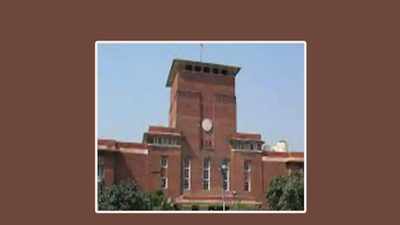- News
- City News
- delhi News
- New English syllabus shows RSS in bad light, claims Delhi University panel member
Trending
This story is from July 14, 2019
New English syllabus shows RSS in bad light, claims Delhi University panel member
A fresh controversy is brewing in Delhi University, this time over syllabus. A member of the standing committee on academic matters, Rasal Singh, has alleged that the updated English syllabus is an attempt to malign Rashtriya Swayamsevak Sangh and its affiliates, nationalist ideology and Indian culture.

NEW DELHI: A fresh controversy is brewing in Delhi University, this time over syllabus. A member of the standing committee on academic matters, Rasal Singh, has alleged that the updated English syllabus is an attempt to malign Rashtriya Swayamsevak Sangh and its affiliates, nationalist ideology and Indian culture.
Singh has alleged that new additions to the syllabus—a story named ‘Maniben alias Bibijaan’ by Shilpa Paralkar on Gujarat riots, and papers like ‘Literature in Caste’ and ‘Interrogating Queerness’—have objectionable content and he will ensure that these are removed.
Singh is also an elected member of Academic Committee from the Right-wing teachers’ group, NDTF. He raised these objections at a meeting on July 11.
He claimed that the story on the Gujarat riots was added “to show the Bajrang Dal in bad light as the principal character is a rioter who murders people during riots”. Singh claimed Manu, the main character, is a Yuvak Bajrang Dal office-bearer and a school teacher who is shown killing people. “The story is trying to show the RSS badly and trying to prove its involvement in the riots,” Singh said.
A teacher of School of Open Learning (SOL)’s English department told TOI that this story has been part of DU’s syllabus for long. “It was there in DU’s old English syllabus and so we have it too at SOL.” But the teacher, who wished to remain anonymous, refused to comment if the story is communal in nature.
Singh had also objected to the addition of the paper ‘Literature in Caste’ and questioned its need. “When did caste in literature become such a big discourse that it should be a separate paper in the syllabus?” he said.
Singh also complained about ‘Interrogating Queerness’ talking about queerness in ancient and Vedic literature. “I objected to a chapter that talks about how LGBTQ origin is found in ancient and Vedic literature. And they have given an example that both Ganesha and Kartikeya were born from same-sex love. This is objectionable. Such content is poisonous to innocent minds and is harmful and divisive. This is a conspiracy against Indian state, culture and ethos,” he alleged.
Kumar responded to this and said the English department believes in debate and discussion, and “if someone thinks that this work will bring communal disharmony, then we can talk about it”. He added that topics like women’s studies, Dalit studies and queer studies are taught the world over, but since DU doesn’t have a separate centre for these, so they decided to include it in their syllabus.
Kumar added that Singh was trying to “play politics”.
Singh has alleged that new additions to the syllabus—a story named ‘Maniben alias Bibijaan’ by Shilpa Paralkar on Gujarat riots, and papers like ‘Literature in Caste’ and ‘Interrogating Queerness’—have objectionable content and he will ensure that these are removed.
Singh is also an elected member of Academic Committee from the Right-wing teachers’ group, NDTF. He raised these objections at a meeting on July 11.
He claimed that the story on the Gujarat riots was added “to show the Bajrang Dal in bad light as the principal character is a rioter who murders people during riots”. Singh claimed Manu, the main character, is a Yuvak Bajrang Dal office-bearer and a school teacher who is shown killing people. “The story is trying to show the RSS badly and trying to prove its involvement in the riots,” Singh said.
Raj Kumar, head of the English department, contested the claims. “The AC member is unnecessarily trying to give our syllabus a communal colour despite us explaining to him that we are, in our syllabus, giving multiple perspectives. The story is fantastical and is not really about the Gujarat riots but something to teach our students how a human being cannot have a fixed identity. It is because of the change that one character has in the story,” Kumar said.
A teacher of School of Open Learning (SOL)’s English department told TOI that this story has been part of DU’s syllabus for long. “It was there in DU’s old English syllabus and so we have it too at SOL.” But the teacher, who wished to remain anonymous, refused to comment if the story is communal in nature.
Singh had also objected to the addition of the paper ‘Literature in Caste’ and questioned its need. “When did caste in literature become such a big discourse that it should be a separate paper in the syllabus?” he said.
Singh also complained about ‘Interrogating Queerness’ talking about queerness in ancient and Vedic literature. “I objected to a chapter that talks about how LGBTQ origin is found in ancient and Vedic literature. And they have given an example that both Ganesha and Kartikeya were born from same-sex love. This is objectionable. Such content is poisonous to innocent minds and is harmful and divisive. This is a conspiracy against Indian state, culture and ethos,” he alleged.
Kumar responded to this and said the English department believes in debate and discussion, and “if someone thinks that this work will bring communal disharmony, then we can talk about it”. He added that topics like women’s studies, Dalit studies and queer studies are taught the world over, but since DU doesn’t have a separate centre for these, so they decided to include it in their syllabus.
Kumar added that Singh was trying to “play politics”.
End of Article
FOLLOW US ON SOCIAL MEDIA










